Precision casting is a versatile manufacturing method employed by FinePrecision to produce intricate and high-quality custom metal parts. As a custom parts manufacturer, we encompass techniques such as die casting, investment casting, gravity casting, and sand casting, each tailored to meet specific production requirements.
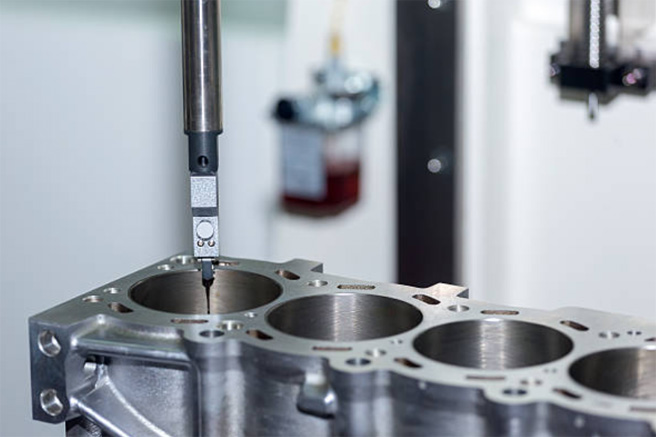
Die casting is efficient, with FinePrecision achieving tight tolerances of ±0.02 mm. This method involves injecting molten metal into a steel mold at high pressures, ensuring precise and repeatable results. The rapid cycle times of die casting contribute to FinePrecision's commitment to delivering on-demand production while maintaining exceptional product quality.
Investment casting, on the other hand, emphasizes intricate designs and superior surface finishes. FinePrecision excels in achieving fine details with a surface finish as low as Ra 1.6. This process involves creating a wax pattern, coating it with a ceramic shell, and then melting it to create a mold for molten metal. The versatility of investment casting makes it a preferred choice for complex components.
Gravity casting is another technique in FinePrecision's repertoire, offering cost-effective solutions for more extensive and less complex parts. With a tolerance range of ±0.1 mm, gravity casting relies on the force of gravity to fill the mold with molten metal. FinePrecision optimizes this method for producing components with excellent structural integrity while maintaining a competitive cost edge.
Sand casting, known for its adaptability to various alloys and sizes, rounds out the precision casting techniques at FinePrecision. This process involves creating molds from sand, allowing for producing more significant components with a tolerance of ±0.5 mm. FinePrecision's expertise in sand casting facilitates the manufacturing of diverse parts with a focus on quality and cost-effectiveness.
Die casting is FinePrecision's highly efficient and precise metal manufacturing process to produce custom parts with exceptional accuracy. In die casting, molten metal is injected into a steel mold, or die, under high pressure, forming complex and detailed components.
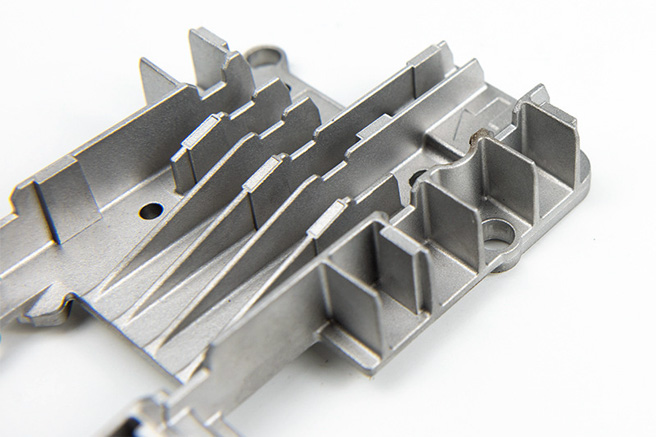
FinePrecision's proficiency in die casting is reflected in achieving tight tolerances of ±0.02 mm, showcasing the precision and reliability of this method. The rapid injection of molten metal into the die allows for quick cycle times, aligning with FinePrecision's commitment to on-demand production. This efficiency not only enhances productivity but also ensures consistent and high-quality results.
One of the critical advantages of die casting lies in its ability to produce intricate designs and complex shapes with minimal post-processing. FinePrecision leverages this capability to meet the diverse requirements of its clients, offering a wide range of custom parts across industries.
Die-casting molds are typically made from hardened steel, ensuring durability and repeatability in the production process. The high-pressure injection of molten metal into the mold results in components with excellent surface finishes and dimensional accuracy. FinePrecision's die-casting expertise extends to various alloys, providing flexibility in material selection to meet specific performance and application needs.
In die casting, the choice of materials is crucial in determining the performance, durability, and overall quality of the custom parts manufacturer --Fine Precision. FinePrecision specializes in die casting with diverse materials, each selected based on specific application requirements. The primary die-casting materials offered by FinePrecision include:
Aluminum Alloys:
Characteristics: Aluminum die-casting alloys, such as A380 and ADC12, are prized for their lightweight nature, excellent corrosion resistance, and high thermal conductivity. It makes them ideal for applications where weight reduction, durability, and efficient heat dissipation are crucial.
Applications: FinePrecision leverages aluminum alloys in automotive components like engine housings, transmission cases, and structural parts. Additionally, these alloys find applications in consumer electronics, where lightweight yet robust components are essential.
Zinc Alloys:
Characteristics: Zinc die-casting alloys, including the Zamak series, are known for their high precision, exceptional casting fluidity, and cost-effectiveness. These alloys have a low melting point, facilitating intricate detailing and quick cycle times.
Applications: FinePrecision utilizes zinc alloys for manufacturing components in consumer electronics, automotive parts requiring intricate designs, and decorative hardware due to their ability to capture fine details.
Magnesium Alloys:
Characteristics: Magnesium die-casting alloys, such as AZ91D, offer remarkable lightweight properties, excellent strength-to-weight ratio, and high thermal conductivity. These alloys are well-suited for applications demanding strength without compromising weight.
Applications: FinePrecision employs magnesium alloys in aerospace components, electronic devices, and power tools, where the combination of strength and lightness is critical.
Copper Alloys:
Characteristics: Copper die-casting alloys provide high electrical conductivity and excellent heat dissipation properties. They are valued for applications where efficient thermal management is paramount.
Applications: FinePrecision utilizes copper alloys to manufacture electrical connectors, heat sinks in electronic devices, and components where electrical conductivity and heat dissipation are crucial.
Brass Alloys:
Characteristics: Brass die-casting alloys, known for their corrosion resistance and aesthetic appeal, offer a balance of form and function.
Applications: FinePrecision applies brass alloys in decorative hardware, plumbing components, and musical instruments, where visual appeal and functional performance are essential.
Investment casting, a sophisticated manufacturing method embraced by FinePrecision, is a precision casting process renowned for creating intricate, high-quality metal parts. This technique is particularly well-suited for components with complex geometries, superior surface finishes, and fine details.
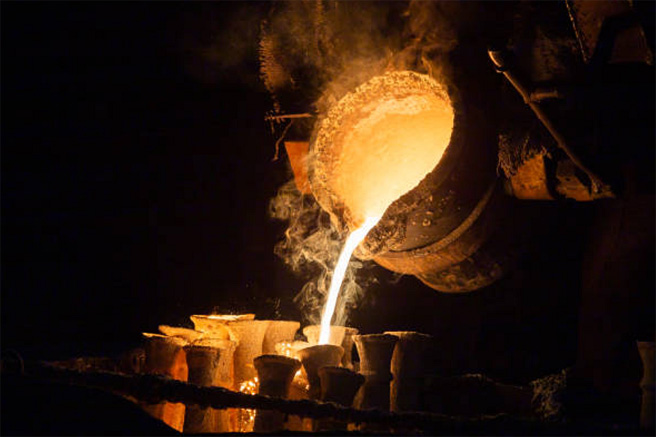
The investment casting process begins with creating a wax pattern replicating the desired part. FinePrecision achieves meticulous precision in this stage, with tolerances as low as ±0.02 mm. The wax pattern is then coated with a ceramic shell through a series of dips, creating a mold that will withstand the high temperatures of molten metal.
Once the ceramic shell is set, the wax inside is melted and drained, leaving behind a precisely shaped cavity. This cavity is the mold for pouring molten metal, typically alloys such as stainless steel, aluminum, or titanium. FinePrecision's investment casting process is tailored to accommodate a wide range of alloys, providing flexibility in material selection.
The casting is conducted with a high degree of control, ensuring that the molten metal fills the mold evenly and accurately captures intricate details. The result is that a cast metal part closely mirrors the original wax pattern. FinePrecision's commitment to excellence is reflected in achieving surface finishes as low as Ra 1.6, meeting the stringent requirements of industries demanding top-tier quality.
Investment casting distinguishes itself by delivering parts with minimal post-processing requirements, reducing the need for additional machining or finishing. This efficiency aligns with FinePrecision's dedication to on-demand production and cost-effectiveness.
FinePrecision's investment casting process is highly versatile, accommodating a wide range of materials to meet the diverse needs of various industries. The selection of materials plays a crucial role in ensuring the desired mechanical properties, corrosion resistance, and overall performance of the cast metal parts. Here are some optional materials used in investment casting at FinePrecision, along with their applications:
Stainless Steel:
· Material Options: 304, 316, 17-4 PH, etc.
· Applications: Within the aerospace industry, FinePrecision employs stainless steel to produce precision components, such as turbine blades and structural elements, where corrosion resistance and high strength are paramount. In the medical sector, stainless steel finds applications in manufacturing surgical instruments and implants.
Carbon Steel:
· Material Options: 1018, 1020, 1045, etc.
· Applications: FinePrecision's use of carbon steel extends to machinery components in sectors like manufacturing and construction. Carbon steel's inherent toughness and affordability make it an ideal choice for parts subjected to heavy loads and wear.
Aluminum Alloys:
· Material Options: A356, 6061, 7075, etc.
· Applications: FinePrecision's expertise in casting aluminum alloys is crucial for industries requiring lightweight components with excellent thermal conductivity. It includes automotive applications such as engine components and aerospace applications like aircraft parts and housings for electronic devices.
Titanium Alloys:
· Material Options: Ti-6Al-4V, Ti-6Al-2Sn-4Zr-2Mo, etc.
· Applications: FinePrecision's investment casting of titanium alloys caters to the aerospace sector, producing components for aircraft engines, airframes, and critical parts in spacecraft. The medical industry benefits from titanium's biocompatibility in producing implants like artificial joints.
Nickel-Based Alloys:
· Material Options: Inconel 718, Hastelloy C-276, etc.
· Applications: In the oil and gas industry, FinePrecision utilizes nickel-based alloys for components subjected to high temperatures, corrosive environments, and extreme pressures. These alloys find applications in downhole equipment, valves, and other critical parts.
Cobalt-Based Alloys:
· Material Options: Cobalt-chromium alloy, etc.
· Applications: FinePrecision's investment casting of cobalt-based alloys is crucial in the medical field for manufacturing orthopedic implants and dental prosthetics. These alloys offer excellent wear resistance and biocompatibility.
Tool Steel:
· Material Options: H13, D2, etc.
· Applications: FinePrecision's investment casting expertise extends to tool steel for producing molds, dies, and tooling components. It is precious in the tool and die manufacturing industry, where high hardness, wear resistance, and toughness are essential for prolonged tool life.
Gravity casting is a crucial and cost-effective manufacturing method employed by FinePrecision in the production of custom metal parts. This technique relies on the force of gravity to fill a mold with molten metal, creating various components with specific shapes and sizes.
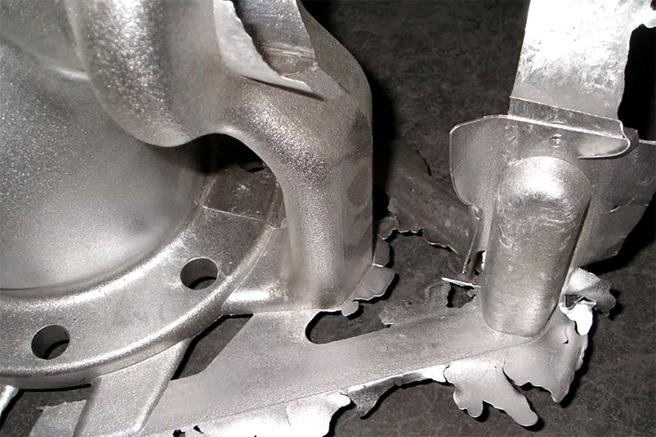
In the gravity casting process at FinePrecision, a metal mold is typically preheated, and the molten metal is poured into the mold cavity. Gravity aids in the complete filling of the mold, ensuring that the molten metal takes the shape of the desired component. This method is particularly suitable for parts that do not require highly tight tolerances but demand structural integrity and cost efficiency.
FinePrecision's gravity casting expertise is characterized by its ability to achieve tolerances as tight as ±0.1 mm, demonstrating a commitment to precision even in this cost-effective production method. This approach is advantageous for manufacturing more extensive and less complex parts, where the emphasis is on achieving the desired shape and functionality.
The gravity casting process offers FinePrecision the flexibility to work with a variety of alloys, making it a versatile solution for different industry applications. This adaptability, combined with the economic benefits of gravity casting, positions FinePrecision as a reliable supplier for clients seeking high-quality custom metal parts at competitive production costs.
Gravity casting at FinePrecision encompasses a wide range of materials, each selected based on the specific requirements of the manufactured custom metal parts. The versatility of gravity casting allows FinePrecision to work with various alloys, tailoring the material choice to meet the final components' desired characteristics and performance standards.
Aluminum Alloys:
· Materials: Aluminum alloys are popular due to their excellent strength-to-weight ratio. A356 is known for its high strength and ductility, A380 for its superior fluidity, and ADC12 for good corrosion resistance.
· Applications: FinePrecision utilizes aluminum gravity casting for various applications, including automotive components like engine blocks and cylinder heads, as well as structural parts in the aerospace industry.
Zinc Alloys:
· Materials: Zinc alloys are favored for producing intricate details and thin walls. Zamak 3 and Zamak 5 are commonly used, offering good casting properties.
· Applications: FinePrecision's expertise in zinc gravity casting is evident in producing decorative hardware, where intricate designs are crucial. Additionally, zinc alloys find applications in the electronics industry for casings and connectors.
Copper Alloys:
· Materials: Copper-based alloys like brass (copper and zinc) and bronze (copper and tin) are chosen for their corrosion resistance and aesthetic appeal.
· Applications: FinePrecision's gravity casting of copper alloys extends to artistic applications, including sculptures and ornamental components. These alloys are also employed in marine environments for their corrosion resistance.
Magnesium Alloys:
· Materials: Magnesium alloys offer excellent strength-to-weight ratios. AZ91D, a commonly used magnesium alloy, provides good castability.
· Applications: FinePrecision's gravity casting of magnesium alloys is significant in aerospace applications, where lightweight components are critical. Magnesium is also employed in electronic devices due to its electrical conductivity.
Other Specialized Alloys:
· Materials: Specialized alloys, including lead, tin, and unique formulations, are employed based on specific project requirements.
· Applications: These alloys find niche applications; for instance, lead may be used for radiation shielding, tin for specific electronic components, and specialized alloys for unique industrial applications.
· Automotive Industry: FinePrecision's aluminum and zinc gravity casting contribute to the production of automotive parts, ensuring a balance of strength and weight.
· Consumer Electronics: Zinc and magnesium alloys are employed in casting electronic housings, providing a combination of durability and lightweight design.
· Aerospace Sector: The lightweight characteristics of magnesium alloys make them ideal for aerospace components, contributing to fuel efficiency and overall performance.
· Art and Sculpture: Copper alloys play a role in creating artistic pieces, combining aesthetic appeal with the benefits of metal casting.
Sand casting is a pivotal manufacturing method FinePrecision employs in producing custom metal parts, offering versatility and cost-effectiveness for a wide range of applications. In this process, a mold is created using a mixture of sand and a bonding agent to form a cavity into which molten metal is poured, solidifying into the desired shape upon cooling.
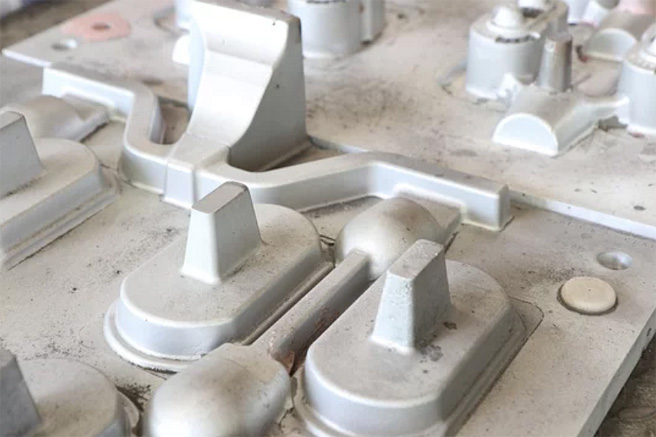
One of the critical advantages of sand casting lies in its adaptability to various alloys, making it a preferred choice for FinePrecision when dealing with diverse material requirements. The process begins with creating a pattern, typically made of wood, metal, or plastic, representing the final part's shape. This pattern is then placed in a box filled with specially formulated sand, creating a mold cavity.
FinePrecision's sand casting process involves precision in every step, ensuring the accurate reproduction of intricate details and features. The sand mixture is compacted around the pattern to create a mold, and any additional features, such as cores, can be incorporated to achieve complex internal geometries.
Once the mold is prepared, it is carefully separated, leaving the cavity for metal casting behind. Molten metal, often aluminum, brass, or iron, is poured into the mold, filling the cavity and taking the shape of the pattern. After the metal cools and solidifies, the sand mold is broken away, revealing the finished metal part.
FinePrecision's expertise in sand casting extends to achieving a tolerance of ±0.5 mm, emphasizing the precision and reliability of this manufacturing method. The process is particularly well-suited for producing more significant components, offering a cost-effective solution for parts that may be challenging or expensive to produce using other methods.
Sand casting at FinePrecision offers a broad spectrum of material options, ensuring flexibility to meet diverse requirements across industries. The choice of materials depends on factors such as mechanical properties, application specifications, and cost considerations. Here's an overview of optional materials and their applications in FinePrecision's sand-casting process:
Gray Iron (GG):
· Properties: Gray iron, characterized by its graphite microstructure, offers excellent machinability, good wear resistance, and efficient vibration damping.
· Applications: FinePrecision commonly employs gray iron in producing components such as engine blocks, brake discs, and other parts requiring strength and durability.
Ductile Iron (GGG):
· Properties: Ductile iron, also known as nodular or spheroidal graphite iron, exhibits high tensile strength, toughness, and ductility due to its nodular graphite structure.
· Applications: FinePrecision utilizes ductile iron for components subjected to heavy loads, including gears, crankshafts, and parts in heavy machinery.
Aluminum Alloys:
· Properties: Aluminum alloys are favored for their lightweight nature, corrosion resistance, and excellent thermal conductivity.
· Applications: FinePrecision often employs aluminum alloys in aerospace components, automotive parts, and electronics housings, capitalizing on the material's advantageous properties.
Brass and Bronze Alloys:
· Properties: Brass and bronze alloys offer good corrosion resistance, electrical conductivity, and an aesthetically pleasing appearance.
· Applications: FinePrecision utilizes these alloys for decorative components, marine hardware, and electrical connectors, where a combination of functionality and visual appeal is essential.
Steel Alloys:
· Properties: Steel alloys provide high strength, hardness, and wear resistance, making them suitable for demanding applications.
· Applications: FinePrecision employs steel alloys for various industrial components, including machinery parts, tools, and construction elements, where robustness and durability are critical.
Magnesium Alloys:
· Properties: Magnesium alloys are lightweight with a favorable strength-to-weight ratio.
· Applications: FinePrecision utilizes magnesium alloys in aerospace components, automotive parts, and electronics, taking advantage of the material's weight-saving benefits.
Copper Alloys:
· Properties: Copper alloys offer excellent electrical conductivity and corrosion resistance.
· Applications: FinePrecision employs copper alloys for electrical components, plumbing fittings, and decorative elements, where conductivity and durability are paramount.
In precision casting, FinePrecision's expertise extends across various techniques, allowing for a comprehensive range of capabilities to meet diverse manufacturing needs. Let's delve into what FinePrecision can achieve in precision casting:
Die Casting Excellence:
FinePrecision specializes in die casting, showcasing an impressive capability to achieve tight tolerances of ±0.02 mm. The die-casting process involves injecting molten metal into precision-designed molds at high pressures, producing intricate and high-quality custom parts. This method is characterized by its efficiency, rapid cycle times, and consistent reproducibility, aligning with FinePrecision's commitment to on-demand production.
Investment Casting Precision:
FinePrecision excels in investment casting, a technique renowned for intricate designs and superior surface finishes. Achieving surface finishes as low as Ra 1.6, FinePrecision's investment casting process involves creating wax patterns, coating them with a ceramic shell, and then melting the wax to form molds for molten metal. This method is ideal for producing complex components with fine details, demonstrating FinePrecision's dedication to precision in every aspect of the manufacturing process.
Gravity Casting Cost-Effectiveness:
FinePrecision leverages gravity casting to provide cost-effective solutions for more extensive, less complex parts. With a tolerance range of ±0.1 mm, gravity casting relies on the force of gravity to fill molds with molten metal. FinePrecision optimizes this method to deliver components with excellent structural integrity, showcasing the company's commitment to balancing precision with cost-effectiveness.
Versatility in Sand Casting:
FinePrecision's sand casting capabilities highlight versatility in handling various alloys and sizes. The sand casting process involves creating sand molds, allowing for the production of more significant components with a tolerance of ±0.5 mm. FinePrecision's expertise in sand casting underscores its adaptability to diverse manufacturing requirements, offering both quality and cost-effective solutions.
FinePrecision's precision casting capabilities encompass die casting, investment casting, gravity casting, and sand casting, showcasing a commitment to delivering custom metal parts with exceptional precision, efficiency, and adaptability. This comprehensive range of techniques makes FinePrecision a reliable one-stop service provider for precision-crafted components across industries.